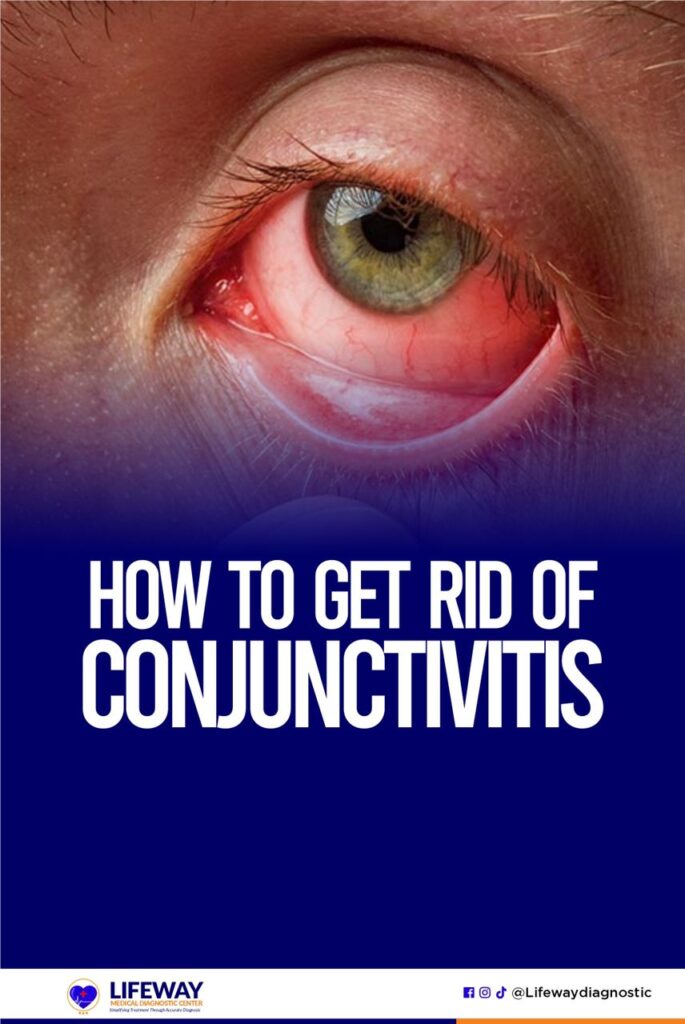Conjunctivitis is a contagious condition that can be caused by bacteria, viruses, or allergens. It often leads to red, itchy, and watery eyes, making everyday tasks a challenge.
While it can be easily spread from person to person, there are ways to effectively treat and prevent the infection from worsening.

If you or someone you know is suffering from conjunctivitis, it’s important to know how to properly address the issue to prevent further discomfort and spread of the infection.
By following some of these simple guidelines and taking the right precautions, you can effectively get rid of conjunctivitis and start seeing clearly again.
Read: Where to get STI Testing
What Is Conjunctivitis?
Conjunctivitis, also known as pink eye, is an inflammation of the thin, transparent layer of tissue that covers the white part of the eye and lines the inner surface of the eyelid.
It can be caused by a variety of factors, including viral or bacterial infections, allergies, or irritants like smoke or chemicals.
Symptoms typically include redness in the white part of the eye, itching or burning sensation, excessive tearing, and discharge from the eye.
What Are The Different Types Of Conjunctivitis?
There are three main types of conjunctivitis: viral, bacterial, and allergic.
Viral conjunctivitis is typically caused by a virus, such as the common cold virus, and can be highly contagious. Symptoms include redness, watery eyes, and discharge.
Bacterial conjunctivitis is caused by bacteria and can also be contagious. Symptoms may include redness, swelling, and a yellow or green discharge from the eye. Treatment usually involves antibiotics prescribed by a doctor.
Allergic conjunctivitis occurs when the eye comes into contact with an allergen, such as pollen or pet dander. Symptoms can include itching, redness, and tearing. Avoiding the allergen and using antihistamine eye drops can help manage symptoms.
How Do I Know If I Have Conjunctivitis?
Conjunctivitis is a common eye condition that can cause redness, itchiness, and discharge in the eyes.
If you are experiencing any of these symptoms, you may have conjunctivitis. Other signs to look out for include watery eyes, sensitivity to light, and a gritty feeling in the eyes.
If you suspect you may have conjunctivitis, it’s important to see an eye doctor for a proper diagnosis and treatment.
They will be able to determine the underlying cause of your symptoms and recommend the appropriate course of action.
In the meantime, avoid touching or rubbing your eyes, wash your hands frequently, and avoid sharing towels or pillows to prevent spreading the infection.
Read: 11 Ways to Keep Your Heart Healthy
How Long Does It Take To Recover From Conjunctivitis?
The recovery time for conjunctivitis can vary depending on the cause and severity of the infection.
In general, viral conjunctivitis may take 1-2 weeks to fully resolve, while bacterial conjunctivitis typically clears up within a few days to a week with proper treatment.
Allergic conjunctivitis can improve once the allergen is removed or treated.
To help speed up recovery, it’s important to follow your doctor’s recommendations, such as using prescribed eye drops or ointments, practicing good hygiene by washing your hands frequently, avoiding touching or rubbing your eyes, and avoiding sharing towels or pillows with others.
If symptoms persist or worsen, be sure to consult with your healthcare provider for further evaluation and treatment.
Remember to give your eyes plenty of rest and care during this time for a quicker recovery.
How Can I Prevent The Spreading Of Conjunctivitis To Others?
To prevent the spreading of conjunctivitis to others, it’s important to practice good hygiene.
Make sure to wash your hands frequently with soap and water, especially after touching your eyes or face.
Avoid sharing towels, pillows, and other personal items that may come into contact with your eyes.
Additionally, try to avoid close contact with others while you have conjunctivitis to reduce the risk of spreading the infection.
If possible, stay home from work or school until your symptoms have improved.
It’s also a good idea to regularly clean and disinfect surfaces that you frequently touch to prevent the spread of germs.
Read: What Causes Shortness of Breath?
What Home Remedies Can Help With Conjunctivitis?
When dealing with conjunctivitis, or pink eye, several home remedies can help alleviate the symptoms and promote healing. Here are some effective options to consider:
Warm Compresses:
Applying warm, clean washcloths to your eyes several times a day can help soothe the irritation and promote healing.
The warmth can help reduce inflammation and loosen any crusty buildup around the eyes.
Saline Solution:
Gently cleaning the eyes with a saline solution can help flush out any irritants or bacteria that may be causing the infection.
You can make a simple saline solution by mixing a teaspoon of salt with a cup of warm water.
Chamomile Tea:
Steeping chamomile tea and using the cooled tea bags as a compress on the eyes can have a soothing and anti-inflammatory effect.
Chamomile has natural healing properties that may help reduce redness and swelling.
Honey:
Applying a small amount of raw, unprocessed honey to the affected eye can have antimicrobial properties that may help fight off bacterial infections.
Be sure to use a clean finger or cotton swab to apply the honey.
Cucumber Slices:
Placing cool cucumber slices over the eyes can help reduce inflammation and provide a refreshing sensation.
The natural cooling properties of cucumbers can offer relief for irritated eyes.
It’s important to remember that while these home remedies can be helpful, they should not replace medical treatment, especially for severe or persistent cases of conjunctivitis.
If the symptoms do not improve or worsen, it’s best to consult with a healthcare professional for proper diagnosis and treatment.
Also Read: How To Perform CPR (Cardiopulmonary Resuscitation)
How To Get Rid Of Conjunctivitis
Dealing with conjunctivitis, also known as pink eye, can be a frustrating experience, but there are steps you can take to get rid of it effectively. Here’s a step-by-step guide:
1. Identify the Cause: Determine whether your conjunctivitis is caused by a viral, bacterial, or allergic reaction. This will help you choose the appropriate treatment.
2. Practice Good Hygiene: Wash your hands frequently, especially before and after touching your eyes. Avoid touching or rubbing your eyes to prevent the spread of the infection.
3. Use Warm Compresses: Apply warm, clean washcloths to your eyes several times a day. This can help soothe the irritation and promote healing.
4. Consider Over-the-counter Treatments: For mild cases, you can use over-the-counter eye drops or ointments containing antihistamines or decongestants to alleviate symptoms. Examples of OTC you can use are chloramphenicol eye drops or ciprofloxacin eye drops.
5. Seek Medical Attention: If the symptoms persist or worsen, or if you suspect a bacterial infection, consult with your healthcare provider. They may prescribe antibiotic eye drops or ointments to treat the underlying cause.
6. Avoid Spreading the Infection: Refrain from sharing personal items, such as towels, pillows, or makeup, and avoid close contact with others until the infection has cleared.
7. Be Patient and Allow Time for Healing: Conjunctivitis can take several days to a week or more to fully resolve, depending on the cause. Follow your healthcare provider’s instructions and be patient as your eyes heal.
Remember, if you experience severe symptoms, such as significant pain, sensitivity to light, or vision changes, seek immediate medical attention, as these may be signs of a more serious eye condition.
Frequently Asked Questions
It’s best to avoid wearing contact lenses until your symptoms have cleared up to prevent further irritation.
Yes, warm compresses and artificial tears can provide relief from symptoms.
If your symptoms worsen or persist for more than a few days, it’s important to consult a healthcare professional.
Conclusion
Dealing with conjunctivitis can be uncomfortable and frustrating, but by following these simple steps, you can effectively get rid of it and prevent its recurrence.
Remember to practice good hygiene, avoid sharing personal items, and seek medical advice if needed.
By taking proactive measures and being mindful of your eye health, you can quickly recover from this common eye condition.
Recommendations
- EEG (Electroencephalogram); All You Need To Know
- Where to get a CT Scan near me
- Spirometry: Understanding and Preparation
- Why Choose Lifeway Medical Diagnostic Center?
- Lifeway Diagnostic Ambulance Service
